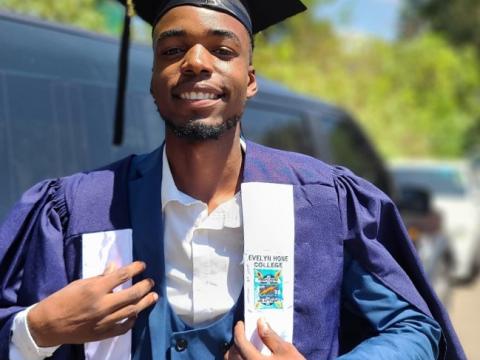Former Child Journalist Graduates as Professional Journalist from college

By Florence Mulenga, Zambia
Lubona, an extraordinary 22-year-old, has achieved an inspiring breakthrough in his life. He has graduated from Evelyn Hone College as a professional journalist. What makes his story even more special is his journey, which began as a child journalist working with World Vision Zambia's Child Rights Advocacy and Media Participation initiative known as Young Journalists Clubs.
World Vision Zambia, in collaboration with Zambia News and Information Services (ZANIS) and private media stations, has been actively involved in empowering children to have a voice on issues affecting their well-being. The primary goal is to make children's voices heard through the media and influence policy changes to end violence against them while also allowing them to participate in decision-making processes. Lubona was among the children who were trained in the basics of journalism and child advocacy through these initiatives.
Lubona's story takes an unexpected turn when he shares that his childhood dream was to become a pilot. However, when he joined the Young Journalists Club introduced by World Vision in 2015 at Keemba Secondary School in Choongo Chiefdom at the age of 14, his career aspirations dramatically shifted.
"In the beginning, I joined the club for the fun of it, but when they trained us in how to write stories, take videos for TV, and participate in live discussions on radio and TV regarding violence against children and gaps in the laws, I developed a keen interest in journalism. By the time I was writing my grade 12 exams, I was convinced I was going to study journalism," Lubona explains.
Lubona's experience in the Young Journalists Club not only gave him the skills needed for journalism but also helped him develop invaluable life skills.
When I joined the club, I was a self-preserved individual who had no idea about group work and lacked the confidence to speak in front of people. But being in a club helped me gain confidence and exposed me to prominent figures like permanent secretaries and ministers. I interacted with artists like Brian Bwembya (B-Flow) and met children from different countries to discuss issues affecting children and drive change. This gave me the confidence to pursue my dreams.

Child participation, as shown by Lubona, helps children not only discover their potential but also fosters a sense of usefulness within their own communities.
I have my share of happiness, knowing that I did something great in our communities alongside my club members. Before we started focusing on national child protection laws, we began in our own communities by influencing the review of Choongo Chiefdom's by-laws in 2016 to include child protection components. It is of great joy that this change was influenced by children. This success gave me the confidence to advocate for children who are being abused, with a particular focus on those in rural areas.
The foundation he gained in journalism through the Young Journalists Club proved to be an added advantage during his college years.
"Being in the club was a great benefit because I already had basic knowledge about journalism, which made it easier for me to excel in college. World Vision also gave me the opportunity to work alongside ZANIS, their communication team, and other media stations in training other children, not only in the Southern Province but also in Northern and Eastern provinces. I am incredibly grateful to World Vision and ZANIS for their support, both during my time in the club and after I finished grade 12. They had a significant influence on my success. I am also deeply thankful to my parents for their unwavering support. I still hope to work for World Vision," he concludes.
Lubona's journey from a young club member to a professional journalist is not only proof to his resilience but also encouraging and inspiring story for many other young individuals. It highlights the significance of World Vision Zambia's sponsorship programs and their steadfast commitment to aiding vulnerable families, especially children. Lubona's success story is a shining example of how investing in the potential of children can lead to impactful change and give rise to future leaders who will advocate for a better world.